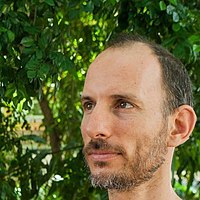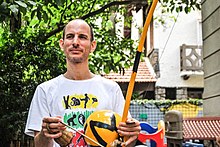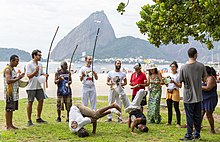Mestre Ferradura: Difference between revisions
No edit summary |
No edit summary |
||
| Line 27: | Line 27: | ||
* ''Brazilian racial ideology: the subjacent racism in comics magazines'' (2015)<ref>{{Citar periódico|ultimo=Campos|primeiro=Abigail Ferreira|data=2019-10-17|titulo=O CONCEITO DE IDEOLOGIA NAS HISTÓRIAS EM QUADRINHOS|url=http://dx.doi.org/10.22533/at.ed.18519171026|publicado=Atena Editora|paginas=283–290|isbn=978-85-7247-718-5}}</ref> |
* ''Brazilian racial ideology: the subjacent racism in comics magazines'' (2015)<ref>{{Citar periódico|ultimo=Campos|primeiro=Abigail Ferreira|data=2019-10-17|titulo=O CONCEITO DE IDEOLOGIA NAS HISTÓRIAS EM QUADRINHOS|url=http://dx.doi.org/10.22533/at.ed.18519171026|publicado=Atena Editora|paginas=283–290|isbn=978-85-7247-718-5}}</ref> |
||
[[File:Capoeira de Rua.jpg|alt=Mestre Ferradura|thumb|Mestre Ferradura conducting a circle of Capoeira de Rua.]] |
[[File:Capoeira de Rua.jpg|alt=Mestre Ferradura|thumb|Mestre Ferradura conducting a circle of Capoeira de Rua.|left]] |
||
His works are academic references in authors of varied fields of pedagogy and studies in the african matrix, influencing and being cited in a series of monographies in Brasil.<ref>{{citar periódico|ultimo=|primeiro=|data=|titulo=Concepções de origem do ser humano e os conhecimentos das religiões de matriz africana|url=http://repositorio.im.ufrrj.br:8080/jspui/bitstream/1235813/2932/1/Bruno%20Batista%20Cassiano%20-%20Jun%202016.pdf|jornal=Repositório UFRRJ|acessodata=}}</ref><ref>{{citar periódico|ultimo=|primeiro=|data=|titulo=A capoeira como ferramenta metodológica na educação infantil: um relato de práticas educativas|url=https://monografias.ufrn.br/jspui/bitstream/123456789/7147/10/CapoeiraFerramentaMetodo_Monografia_2018.pdf|jornal=Monografias UFRN|acessodata=}}</ref><ref>{{citar periódico|ultimo=|primeiro=|data=|titulo=Uma intervenção psicopedagógica para educadores sociais de capoeira|url=https://www.editorarealize.com.br/revistas/conedu/trabalhos/TRABALHO_EV073_MD1_SA1_ID1065_21082017143144.pdf|jornal=IV Congresso Nacional de Educação - CONEDU|acessodata=}}</ref><ref>{{citar periódico|ultimo=|primeiro=|data=|titulo=CONTRIBUIÇÃO DA CAPOEIRA NO PROGRAMA MAIS EDUCAÇÃO PARA A PROMOÇÃO DA CULTURA AFRO-BRASILEIRA: a experiência de um Centro Integrado de Educação Pública em Santa Bárbara d’Oeste/SP|url=https://unisal.br/wp-content/uploads/2017/04/Disserta%C3%A7%C3%A3o_Elisangela-L.-F.-de-Moraes.pdf|jornal=Repositório de Monografias da UNISAL|acessodata=}}</ref><ref>{{citar periódico|ultimo=|primeiro=|data=|titulo=O convívio da diferença: práticas biopolíticas no jogo de dentro e no jogo de fora|url=https://tede2.pucsp.br/bitstream/handle/21858/2/Livia%20Sernache%20Rios.pdf|jornal=Respositório de Dissertações PUC-SP|acessodata=}}</ref><ref>{{citar periódico|ultimo=|primeiro=|data=|titulo=CAPOEIRA ANGOLA NA ESCOLA MUNICIPAL NOVA MORADA: perspectivas e práticas educativas na construção das identidades culturais|url=http://ww2.ppgeci.ufrpe.br/sites/ww2.ppgeci.ufrpe.br/files/documentos/dissertacao_ppgeci_n._30_danilo_santos_do_vale.pdf|jornal=Repositório do Programa de Pós-Graduação da UFPE|acessodata=}}</ref> |
His works are academic references in authors of varied fields of pedagogy and studies in the african matrix, influencing and being cited in a series of monographies in Brasil.<ref>{{citar periódico|ultimo=|primeiro=|data=|titulo=Concepções de origem do ser humano e os conhecimentos das religiões de matriz africana|url=http://repositorio.im.ufrrj.br:8080/jspui/bitstream/1235813/2932/1/Bruno%20Batista%20Cassiano%20-%20Jun%202016.pdf|jornal=Repositório UFRRJ|acessodata=}}</ref><ref>{{citar periódico|ultimo=|primeiro=|data=|titulo=A capoeira como ferramenta metodológica na educação infantil: um relato de práticas educativas|url=https://monografias.ufrn.br/jspui/bitstream/123456789/7147/10/CapoeiraFerramentaMetodo_Monografia_2018.pdf|jornal=Monografias UFRN|acessodata=}}</ref><ref>{{citar periódico|ultimo=|primeiro=|data=|titulo=Uma intervenção psicopedagógica para educadores sociais de capoeira|url=https://www.editorarealize.com.br/revistas/conedu/trabalhos/TRABALHO_EV073_MD1_SA1_ID1065_21082017143144.pdf|jornal=IV Congresso Nacional de Educação - CONEDU|acessodata=}}</ref><ref>{{citar periódico|ultimo=|primeiro=|data=|titulo=CONTRIBUIÇÃO DA CAPOEIRA NO PROGRAMA MAIS EDUCAÇÃO PARA A PROMOÇÃO DA CULTURA AFRO-BRASILEIRA: a experiência de um Centro Integrado de Educação Pública em Santa Bárbara d’Oeste/SP|url=https://unisal.br/wp-content/uploads/2017/04/Disserta%C3%A7%C3%A3o_Elisangela-L.-F.-de-Moraes.pdf|jornal=Repositório de Monografias da UNISAL|acessodata=}}</ref><ref>{{citar periódico|ultimo=|primeiro=|data=|titulo=O convívio da diferença: práticas biopolíticas no jogo de dentro e no jogo de fora|url=https://tede2.pucsp.br/bitstream/handle/21858/2/Livia%20Sernache%20Rios.pdf|jornal=Respositório de Dissertações PUC-SP|acessodata=}}</ref><ref>{{citar periódico|ultimo=|primeiro=|data=|titulo=CAPOEIRA ANGOLA NA ESCOLA MUNICIPAL NOVA MORADA: perspectivas e práticas educativas na construção das identidades culturais|url=http://ww2.ppgeci.ufrpe.br/sites/ww2.ppgeci.ufrpe.br/files/documentos/dissertacao_ppgeci_n._30_danilo_santos_do_vale.pdf|jornal=Repositório do Programa de Pós-Graduação da UFPE|acessodata=}}</ref> |
||
Revision as of 16:59, 21 March 2020
Mestre Ferradura | |
|---|---|
| Omri Ferradura Breda | |
 | |
| Born | January 22, 1976 |
| Alma mater | Universidade Federal do Estado do Rio de Janeiro |
| Occupation | President of the Brazilian Capoeira-Education Institute Director of the Brincadeira de Angola Project |

Omri Ferradura Breda, commonly known as Mestre Ferradura (January 22, 1976), is a Mestre de Capoeira, pedagogue, president of the Brazilian Institute of Capoeira Education, and director of the Brincadeira de Angola project.
Biography
Master Ferradura started practicing Capoeira in 1991, at Rio de Janeiro, at Mestre Marrom's Capoeira Angola. He started teaching Capoeira in 1993. Mestre Ferradura received his graduation by the Capoeira Master Henrique Anastacio de Jesus, the Mestre Marrom, in 2010.[1] He graduated in pedagogy from the Federal University of the State of Rio de Janeiro, and specialized in Early Childhood Education. He is the founder and coordenator of Brincadeira de Angola Project, which has the purpose of the playful teaching of capoeira applied to early childhood education.[2] The Brazilian Institute of Capoeira Education, project which he's president, he helps teachers to understand the concepts of Capoeira Education.[3]
Contributions to the Capoeira Education field
Master Ferradura possesses broad projection while difunding the Brincadeira de Angola method, which is a pedagic-philosophic based on the educational potential, applying Capoeira as a transformative pedagogic practice in autonomous subjects formation, and deconstruction of racism through the valorization of the african roots.[4][5] The basis of the methology is the ancestral knowledge of Capoeira, passed on from master to disciple in a traditional way. By balancing these popular and academic knowledge, the Brincadeira de Angola method suggest a Capoeira Pedagogy.[6] Another contribution by Mestre Ferradura to the Capoeira community was the production of "Movimento Novo" (New Movement), along with Mestre Itapuã Beira-Mar, which brought discussions around the resulting violence from the contact of capoeirists from different schools and proposes a pacific interaction to the new generations.[7][8]
Research and academic production
In the past decade, Mestre Ferradura has acted in the formation of teacher and promoting his pedagogic methodology in Brazil and Europe. His influences include Paulo Freire, Muniz Sodré, Marshall Rosemberg, Emilia Viotti da Costa, Elisa Larkin Nascimento, Thomas E. Skidmore, Nestor Capoeira, Michel Foucalt, A.S. Neil, Terry Orlick, and Peter Slade.[9] In his academic outreach, Mestre Ferradura travels and joins a number of formation programs and training of teachers and mestres in Brazilian and international Universities. Among the institutions which his courses and symposia have been ministrated, are included UFRR, UFBA, USP, and Museu da República.[10][11][12][13][14][15]
His most notable articles are:
- Capoeira as a transformative educational practive (2010)[9]
- Capoeira as pedagogic practice in early childhood education (2015)[16]
- Capoeira as a libertarian education for the formation of autonomous subjects - the teaching practices in Rio de Janeiro's Rodas de Rua (2019)[17]
- Brazilian racial ideology: the subjacent racism in comics magazines (2015)[18]

His works are academic references in authors of varied fields of pedagogy and studies in the african matrix, influencing and being cited in a series of monographies in Brasil.[19][20][21][22][23][24]
Social action
Mestre Ferradura's participations in social action includes occasional participation in activities of the Third Sector to regular governamental projects, such as:
When we bring Capoeira de Rua for them, is a bit of culture and visibility. At the same time, we bring the idea of social circle, the look eye-in-the-eye, the care, the shelter, the belonging, and the knowledge that in that circle, you are just one capoeirist.
Homeless people goes through a process of invisibilization. At Capeoira, we have necessarily to look at each other, interact, touch, know a bit of our feelings and needs of each other. The student's self-esteem is enhanced when he's seen, when he's heard, in his most basic needs of care, shelter, and belonging.
- At the Benjamin Constant Institute, with a project of educating Capoeira to blind children[25]
- At DEGASE, with institutionalized teenagers serving socio-educational measures[26][27]
- The Capoeira de Rua, with homeless people[28][29]
- The Brazilian Capoeira-Education Institute for the Peace, in partnership with Gingando Pela Paz, UNESCO, and Viva Rio[30]
Artistic contributions
In the artistic fields, Mestre Ferradura has worked in a variety of direction of Capoeira, like:
- Intrépida Trupe, in the Kronos show, having participated in the front commission of Mocidade Independente de Padre Miguel, which won the Tamborim de Ouro Award in 1999.
- With Paola Barreto Leblanc, when signed the direction of Capoeira and writing the script of the "Maré Capoeira" movie.[31]
- With João Falcão, director of "Ópera do Malandro", when he did body conditioning of the troup at Theatro Municipal do Rio de Janeiro.
External Links
- Portal da Capoeira
- Instituto Brasileiro de Capoeira-Educação
- Projeto Brincadeira de Angola
- Capoeira Rio de Janeiro
References
- ^ "Portal da Capoeira". www.capoeira.gov.br. Retrieved 2020-02-27.
- ^ "CEPE USP" (PDF).
- ^ "Mestre Ferradura". IBCE. Retrieved 2020-02-28.
- ^ "Capoeira na escola é uma janela para a desconstrução do racismo". CEERT (in Brazilian Portuguese). Retrieved 2020-02-28.
- ^ Capoeira, Rolha (2016-09-07). "Mestre Ferradura’s Great Insight on the Importance of Capoeira’s African Roots". www.capoeiranewsonline.com. Retrieved 2020-02-28.
- ^ "17 de julho de 2019 - Iê Camará". tribunadoceara.com.br. Retrieved 2020-02-28.
- ^ "Capoeira: O Último Movimento Novo (Com Vídeos)". Capoeira - Rio (in Brazilian Portuguese). 2019-01-03. Retrieved 2020-02-28.
- ^ CAPOEIRA, Nestor (2002). O Novo Manual do Jogador. Rio de Janeiro: Record. p. 488. ISBN 978-8501048790.
- ^ a b "Educação Pública - Biblioteca - Educação Física e jogos". www.educacaopublica.rj.gov.br. Retrieved 2020-02-28.
- ^ "Mestres Dunga e Ferradura fazem oficinas de capoeira na UFRR". Globoesporte.com.
- ^ "O ensino e a difusão da capoeira foi debatido no XV Enecult – ENECULT". Retrieved 2020-02-28.
- ^ "CEPEUSP - Centro de Práticas Esportivas da USP – Simpósio Internacional de Capoeira". www.cepe.usp.br. Retrieved 2020-02-28.
- ^ Culturais, Mapas (2019-05-08). "Mestre Ferradura". Mapas Culturais (in Brazilian Portuguese). Retrieved 2020-02-28.
- ^ "Projeto Capoeirando terá aulas gratuitas para o público infantil". Correio do Estado. Retrieved 2020-02-28.
- ^ "Goiânia recebe curso de Formação Continuada em Capoeira na Educação Infantil | Revista Zelo". revistazelo.com.br. Retrieved 2020-02-28.
- ^ "Revista Educação Pública - A Capoeira como prática pedagógica na Educação Infantil". educacaopublica.cecierj.edu.br (in Brazilian Portuguese). Retrieved 2020-02-28.
- ^ "Revista Educação Pública - Capoeira e educação libertária para formação de sujeitos autônomos – as práticas de ensino nas rodas de rua do Rio de Janeiro". educacaopublica.cecierj.edu.br (in Brazilian Portuguese). Retrieved 2020-02-28.
- ^ Campos, Abigail Ferreira (2019-10-17). "O CONCEITO DE IDEOLOGIA NAS HISTÓRIAS EM QUADRINHOS". Atena Editora: 283–290. ISBN 978-85-7247-718-5.
{{cite journal}}: Cite journal requires|journal=(help) - ^ "Concepções de origem do ser humano e os conhecimentos das religiões de matriz africana" (PDF). Repositório UFRRJ.
- ^ "A capoeira como ferramenta metodológica na educação infantil: um relato de práticas educativas" (PDF). Monografias UFRN.
- ^ "Uma intervenção psicopedagógica para educadores sociais de capoeira" (PDF). IV Congresso Nacional de Educação - CONEDU.
- ^ "CONTRIBUIÇÃO DA CAPOEIRA NO PROGRAMA MAIS EDUCAÇÃO PARA A PROMOÇÃO DA CULTURA AFRO-BRASILEIRA: a experiência de um Centro Integrado de Educação Pública em Santa Bárbara d'Oeste/SP" (PDF). Repositório de Monografias da UNISAL.
- ^ "O convívio da diferença: práticas biopolíticas no jogo de dentro e no jogo de fora" (PDF). Respositório de Dissertações PUC-SP.
- ^ "CAPOEIRA ANGOLA NA ESCOLA MUNICIPAL NOVA MORADA: perspectivas e práticas educativas na construção das identidades culturais" (PDF). Repositório do Programa de Pós-Graduação da UFPE.
- ^ "Alunos fazem exibição de capoeira aos pais". www.ibc.gov.br. Retrieved 2020-02-28.
- ^ Bueno, Luzia (2005-12-15). "Gêneros da Mídia Impressa no Material Didático e a Notícia Adaptada". Signum: Estudos da Linguagem. 8 (2): 9. doi:10.5433/2237-4876.2005v8n2p9. ISSN 2237-4876.
- ^ "Carioca nota 10: Mestre Ferradura" (in Brazilian Portuguese).
- ^ "Vidas Invisíveis: série mostra um novo perfil dos moradores de rua". R7.com (in Brazilian Portuguese). 2019-12-11.
- ^ Como Será? | Rede de solidariedade ajuda pessoas em situação de rua no Rio de Janeiro | Globoplay (in Brazilian Portuguese), retrieved 2020-02-28
- ^ "Gingando pela Paz Haiti completa quatro anos". Viva Rio (in Brazilian Portuguese). 2012-10-01. Retrieved 2020-02-28.
- ^ PortaCurtas. "Maré Capoeira". Porta Curtas (in Brazilian Portuguese). Retrieved 2020-02-28.
